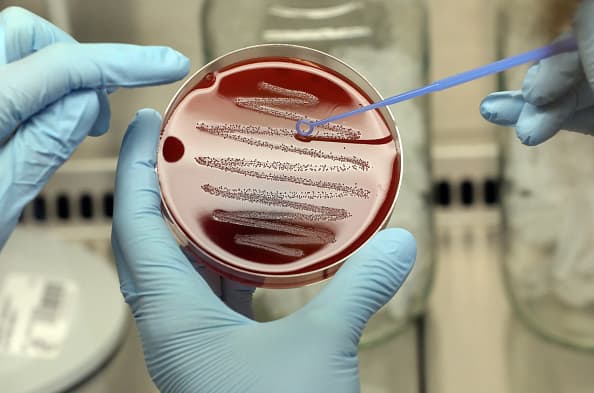Antimicrobial resistance (AMR), also known as the “silent pandemic” by the World Health Organization (WHO), poses a large and often-neglected global health threat. AMR occurs when microorganisms, such as bacteria, viruses, fungi, and parasites, have the ability to survive and reproduce despite the existence of drugs designed to eliminate them. To make matters worse, scientific research has revealed the exacerbating influence of climate change on the emergence and spread of AMR.
A microbiologist at the Max-Planck-Institute for Infection Biology was recently seen preparing a bacterial colony of the Streptococcus pyogenes strain on a blood agar plate, underlining the significance of the issue. Amid rising global temperatures, experts are concerned that the escalating threat of drug-resistant superbugs is becoming more challenging to contain.
The WHO has declared AMR as one of the top 10 global health menaces, linking approximately 1.3 million deaths annually to the impact of resistant pathogens. Urgent action is crucial to prevent these figures from rapidly escalating, as it will lead to higher public health, economic, and social costs, especially in low-income nations.
Antimicrobials like antibiotics and antivirals are instrumental in treating and preventing infections in both humans and animals. However, through overuse and misuse, the primary driving factors behind the development of AMR. Research has indicated that the increasing global temperatures are associated with a higher transmission of infectious diseases – including AMR bacteria. This problem is exacerbated amid extreme weather events and worsening pollution, creating favorable conditions for bugs to develop resistance.
Tina Joshi, an associate professor of molecular microbiology at the University of Plymouth, warned that AMR is often overlooked and regarded as a “silent pandemic.” Despite its devastating consequences, societal awareness and action seem limited.
Robb Butler, director of the division of communicable diseases, environment and health at WHO Europe, stressed that AMR is an “extremely pressing global health challenge” with immense financial and health burdens, placing an annual cost of around 1.5 billion euros on EU member states. Furthermore, the looming COP28 climate conference presents an opportunity for policymakers to recognize the association between the climate crisis and AMR and take corrective action.
The lack of focus on the development of antibiotics and their unique characteristics is a concern for industry leaders according to Tina Joshi. This challenge has to be addressed and resolved if there is to be any hope of addressing the AMR crisis. Global preparedness for the next pandemic – potentially antibiotic resistant bacteria – should be a top priority.
The alarm has been sounded. Policymakers must heed it and turn their focus towards incentivizing research and development in the production of antibiotics, which the world is in dire need of.


